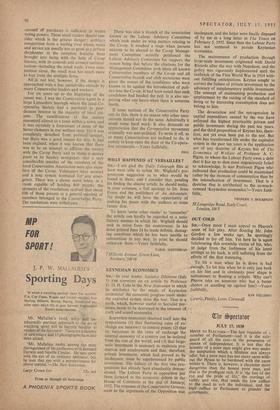KEYNESIAN ECONOMICS Sta.—In your leader, Socialist Dilemma (July 1) you
comment on an article by Professor G. D. H. Cole in the New Statesman in which he attributes `to the magic of Keynesian economics' the economic progress made under the capitalist system since the war. That is a myth, which, however useful to Socialist pur- poses. needs to be destroyed in the interests of truth and sound economics.
Keynesian economics resolved itself into the propositions (1) that fluctuating rates of ex- change are necessary to control prices; (2) that by variations in the rates of exchange the internal economy of a country can be isolated from the rest of the world; and (3) that large- scale investment is necessary to maintain pro- duction and employment and that, therefore, private investment, which had proved to be inadequate; must be supplemented by public investment. The fallacy of the first two pro- positions has already been abundantly demon- strated. The Labour Party in opposition put them forward in the economic debate in the House of Commons at the end of January, 1952. The response of the Conservative Govern- ment to the arguments of the Opposition was inadequate, and the latter were finally disposed of by me in a long letter in The Times on February 5, 1952. Since then the Labour Party has, not ventured to parade Keynesian economics.
The maintenance of production through large-scale investment originated with David Ricardo after the war with Napoleon, and the policy was vigorously implemented until the outbreak of the First World War in 1914 with- out fulfilling anticipations. Keynes sought to correct the failure of private investment by the advocacy of supplementary public investment. The concept of maintaining production and employment by the raising of the standard of living or by increasing consumption does not belong to him.
The devastation and the retrogression in capital expenditure caused by the war have enforced the highest practicable private and public investment during the past ten years, and the third proposition of Keynes has, there- fore, not yet even been put to the test. But what has transformed life under the capitalist system in the past ten years is the application not of any doctrine of Keynes but of The Economics of Welfare of Professor A. C. Pigou, to whom the Labour Party owes a debt that it has up to date most ungraciously failed to acknowledge. It was Professor Pigou who indicated that production could be maintained rather by the increase of consumption than by the intensification of investment. That is a doctrine that is antithetical to the so-much- vaunted 'Keynesian economics.'—Yours faith- fully,
FREDERIC E. HOLSINGER
38 Longridge Road, Earls Court. London, SWS


































 Previous page
Previous page